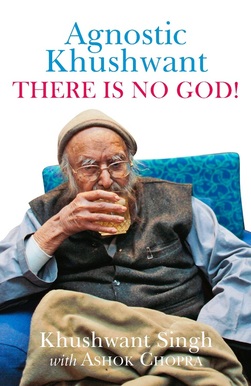
Instead of entering into a pointless debate on whether or not God exists, it is more important to bear in mind that belief in the existence of God has little bearing on making a person a good or a bad citizen. One can be a saintly person without believing in God and a detestable villain believing in Him. In my personalized religion, there is NO GOD!
Khushwant Singh, over the decades, has built up a reputation for coming up with something new and controversial in each book, and he does not disappoint his readers this time too. He begins with a chapter on the ‘need for a new religion – without God’, in which he questions the relevance of God. He then moves on to describe how religion has proved to be more harmful than beneficial and, in the process, debunks astrologers and the breed of so-called ‘godmen’.
However, he is not dismissive of religion. Through his lucid writing, he brings out the beauty and significance of holy books such as the Bhagvad Gita, the Quran and the Granth Sahib. He provides relevant extracts to highlight the poetry and the music in such books.
The author next tries to dispel the prejudices held by many non-Muslims against their Muslim compatriots by giving down-to-earth examples. He also emphasizes the importance of the Ramzaan fast.
Khushwant Singh’s description of the life and times of Guru Nanak and Guru Gobind Singh and his in-depth analysis of the Granth Sahib throw new light on a particularly troubled period in India’s history. The chapter devoted to the interaction of the author (a confirmed agnostic) with the Dalai Lama (probably the world’s most renowned spiritual leader) makes for fascinating reading. Here’s one book containing a wealth of knowledge and information that you would want to read or consult again and again.
Khushwant Singh, over the decades, has built up a reputation for coming up with something new and controversial in each book, and he does not disappoint his readers this time too. He begins with a chapter on the ‘need for a new religion – without God’, in which he questions the relevance of God. He then moves on to describe how religion has proved to be more harmful than beneficial and, in the process, debunks astrologers and the breed of so-called ‘godmen’.
However, he is not dismissive of religion. Through his lucid writing, he brings out the beauty and significance of holy books such as the Bhagvad Gita, the Quran and the Granth Sahib. He provides relevant extracts to highlight the poetry and the music in such books.
The author next tries to dispel the prejudices held by many non-Muslims against their Muslim compatriots by giving down-to-earth examples. He also emphasizes the importance of the Ramzaan fast.
Khushwant Singh’s description of the life and times of Guru Nanak and Guru Gobind Singh and his in-depth analysis of the Granth Sahib throw new light on a particularly troubled period in India’s history. The chapter devoted to the interaction of the author (a confirmed agnostic) with the Dalai Lama (probably the world’s most renowned spiritual leader) makes for fascinating reading. Here’s one book containing a wealth of knowledge and information that you would want to read or consult again and again.

